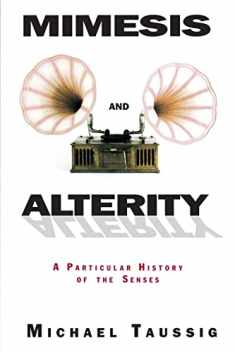
Defacement: Public Secrecy and the Labor of the Negative
ISBN-13:
9780804732000
ISBN-10:
0804732000
Edition:
1
Author:
Michael Taussig
Publication date:
1999
Publisher:
Stanford University Press
Format:
Paperback
326 pages
Category:
Criminology
,
Social Sciences
FREE US shipping
Book details
ISBN-13:
9780804732000
ISBN-10:
0804732000
Edition:
1
Author:
Michael Taussig
Publication date:
1999
Publisher:
Stanford University Press
Format:
Paperback
326 pages
Category:
Criminology
,
Social Sciences
Summary
Defacement: Public Secrecy and the Labor of the Negative (ISBN-13: 9780804732000 and ISBN-10: 0804732000), written by authors
Michael Taussig, was published by Stanford University Press in 1999.
With an overall rating of 3.7 stars, it's a notable title among other
Criminology
(Social Sciences) books. You can easily purchase or rent Defacement: Public Secrecy and the Labor of the Negative (Paperback) from BooksRun,
along with many other new and used
Criminology
books
and textbooks.
And, if you're looking to sell your copy, our current buyback offer is $4.1.
Description
Defacement asks what happens when something precious is despoiled. It begins with the notion that such activity is attractive in its very repulsion, and that it creates something sacred even in the most secular of societies and circumstances. In specifying the human face as the ideal type for thinking through such violation, this book raises the issue of secrecy as the depth that seems to surface with the tearing of surface. This surfacing is made all the more subtle and ingenious, not to mention everyday, by the deliberately partial exposures involved in "the public secret"―defined as what is generally known but, for one reason or another, cannot easily be articulated. Arguing that this sort of knowledge ("knowing what not to know") is the most powerful form of social knowledge, Taussig works with ideas and motifs from Nietzsche, William Burroughs, Elias Canetti, Georges Bataille, and the ethnography of unmasking in so-called primitive societies in order to extend his earlier work on mimesis and transgression. Underlying his concern with defacement and the public secret is the search for a mode of truth telling that unmasks, but only to reenchant, thereby underlining Walter Benjamin's notion that "truth is not a matter of exposure of the secret, but a revelation that does justice to it."


We would LOVE it if you could help us and other readers by reviewing the book
Book review

Congratulations! We have received your book review.
{user}
{createdAt}
by {truncated_author}



